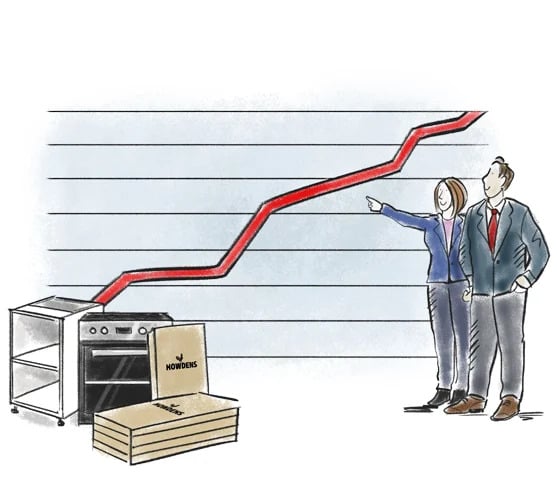Howden Joinery Group Plc
Terms of Reference of the Audit Committee
Last approved: 3 November 2022
1. | Membership | ||||
| 1.1 | Members of the Committee shall be appointed by the Board, on the recommendation of the Nomination Committee and in consultation with the Chair of the Audit Committee. | ||||
| 1.2 | The Committee shall be made up of at least three members, all of whom shall be independent non-executive directors as determined by the Board (in accordance with the provisions of the UK Corporate Governance Code). If the Board decides that a member of the Committee is no longer independent, that member will cease to be a member of the Committee. The Chair of the Board shall not be a member of the Committee. | ||||
| 1.3 | At least one member of the Committee must have been determined by the Board to have recent and relevant financial experience and a competence in accounting and/or auditing evidenced by a professional qualification from a professional accountancy body and, where possible, at least one member of the Committee shall be a member of the Remuneration Committee. The Committee as a whole should have competence relevant to the sector in which the Company is operating. | ||||
| 1.4 | The Committee Chair shall review membership of the Committee annually, as part of the annual performance evaluation of the Committee. | ||||
| 1.5 | Only members of the Committee have the right to attend Committee meetings. However, other individuals, including, but not limited to, the Chair of the Board, CEO, DCEO & CFO, other directors, the Head of Risk and Internal Audit and representatives from the Finance function may be invited to attend all or part of any meeting as and when appropriate. | ||||
| 1.6 | The external auditors will be invited to attend meetings of the Committee on a regular basis. | ||||
| 1.7 | Appointments to the Committee shall be for a period of up to three years, which may be extended for two further three year periods, provided the director remains independent and meets the other criteria for membership of the Committee. | ||||
| 1.8 | The Board shall appoint the Committee Chair who shall be an independent non-executive director. In the absence of the Committee Chair and/or an appointed deputy, the remaining members present shall elect one of themselves to chair the meeting. | ||||
2. | Secretary | ||||
| 2.1 | The Company Secretary shall act as the Secretary to the Committee. | ||||
3. | Quorum | ||||
| 3.1 | The quorum necessary for the transaction of business shall be two members present in person or by electronic communication (where each person is able to speak and to be heard by all those deemed to be present simultaneously). A duly convened meeting of the Committee at which a quorum is present shall be competent to exercise all or any of the authorities, powers and discretions vested in or exercisable by the Committee. Wherever practically possible, one member of the quorum shall have recent and relevant financial experience and with competence in accounting and/or auditing. | ||||
4. | Meetings | ||||
| 4.1 | The Committee must meet as often as it deems necessary but at least three times a year at appropriate intervals in the financial reporting and audit cycle. The Committee must approve the annual calendar of its meetings. | ||||
| 4.2 | Outside of the formal meeting programme, the Committee Chair will maintain a dialogue with key individuals involved in the Company’s governance, including the Board Chair, the CEO, DCEO &CFO, the Company Secretary and the external audit lead partner and the Head of Internal Audit and Risk. | ||||
5. | Notice of Meetings | ||||
| 5.1 | Meetings of the Committee shall be summoned by the Secretary of the Committee at the request of any of its members or at the request of external or internal auditors if they consider it necessary. | ||||
| 5.2 | Unless otherwise agreed by all Committee members, notice of each meeting confirming the venue, time and date (and dial-in details if required), together with an agenda of items to be discussed, shall be forwarded to each member of the Committee, any other person required to attend and all other non-executive directors, no later than five working days before the date of the meeting. Supporting papers shall be sent to Committee members and to other attendees as appropriate, at the same time. Notices, agendas and supporting papers may be sent in electronic form where the recipient has agreed to receive documents in such a way. | ||||
| 5.3 | The Secretary must ensure that the Committee receives information and materials in a timely manner to enable full and proper consideration to be given to them. | ||||
6. | Minutes of the Meetings | ||||
| 6.1 | The Secretary shall minute the proceedings and resolutions of all meetings of the Committee, including recording the names of those present and in attendance. | ||||
| 6.2 | The Secretary shall ascertain at the beginning of each meeting, the existence of any conflicts of interest and minute them accordingly. | ||||
| 6.3 | Draft minutes of Committee meetings must be sent promptly to all members of the Committee. Once approved, minutes of Committee meetings must be sent to all members of the Board unless the Chair of the Committee thinks it is inappropriate to do so (including if a conflict of interest arises). | ||||
7. | Annual General Meeting | ||||
| 7.1 | The Chair of the Committee shall attend the Annual General Meeting prepared to respond to any shareholder questions on the Committee's area of responsibility and activities and make a statement on the activities and achievements of the Committee over the year, as directed by the Chair of the Board. | ||||
8. | Duties | ||||
| 8.1 | The Committee should carry out the duties below for the Parent Company, and the Group as a whole, as appropriate. | ||||
| Financial Reporting | |||||
| 8.2 | The Committee shall monitor the integrity of the financial statements of the Company and any other formal announcement relating to its financial performance. | ||||
| 8.3 | The Committee shall review and report to the Board on significant financial reporting issues and judgements made in connection with the preparation of the company’s financial statements and disclosures in accordance with accounting standards and other regulations and any other formal announcements relating to its financial performance (having regard to matters communicated to it by the auditor). The Committee shall also review summary financial statements, significant financial returns to regulators and any financial information contained in certain other documents, such as announcements of a price sensitive nature. | ||||
| 8.4 | The Committee shall review and challenge where necessary. | ||||
| 8.4.1 | the consistency of, and any changes to, accounting policies both on a year on year basis and across the Company/Group; | ||||
| 8.4.2 | the methods used to account for significant or unusual transactions where different approaches are possible; | ||||
| 8.4.3 | whether the Company has followed appropriate accounting standards and made appropriate estimates and judgements, taking into account the views of the external auditor; | ||||
| 8.4.4 | the clarity of disclosure in the Company’s financial reports and the context in which statements are made; | ||||
| 8.4.5 | all material information presented with the financial statements, such as the strategic report and the corporate governance statement (in so far as it relates to the audit and risk management) and statements related to internal control, risk management, viability and going concern; | ||||
| 8.4.6 | the assumptions or qualifications in support of the going concern statement (including any material uncertainties as the Company’s ability to continue as a going concern over a period of at least 12 months from the date of approval of the financial statements) and the longer term viability statement (including an assessment of the prospects of the Company and the Group looking forward over an appropriate and justified period); and | ||||
| 8.4.7 | any other statements requiring board approval which contain financial information first, where to carry out a review prior to board approval would be practicable and consistent with any prompt reporting requirements under any law or regulation including the Listing Rules or Disclosure Guidance and Transparency Rules sourcebook. | ||||
| 8.5 | Where the Committee is not satisfied with any aspect of the proposed financial reporting by the Company, it shall report its views to the Board. | ||||
| Narrative Reporting | |||||
| 8.6 | Where requested by the Board, the Committee should review the content of the Annual Report and Accounts and advise the Board on whether, taken as a whole, it is fair, balanced and understandable and provides the information necessary for shareholders to assess the Company’s performance, business model and strategy. | ||||
9. | Internal Controls and Risk Management Systems | ||||
| The Committee shall: | |||||
| 9.1 | monitor and keep under review the adequacy and effectiveness of the Company’s internal financial controls and control and risk management systems; | ||||
| 9.2 | review and approve the statements to be included in the Annual Report concerning internal controls and risk management; | ||||
| 9.3 | where requested by the Board, provide advice on how, taking into account the Company’s position and principal risks, the Company’s prospects have been assessed, over what period and why the period is regarded as appropriate in relation to on-going viability. The Committee shall also advise on whether there is a reasonable expectation that the Company will be able to continue in operation and meet its liabilities as they fall due over the said period, drawing attention to any qualifications or assumptions as necessary; and | ||||
| 9.4 | where requested by the Board, the Committee shall review the content of the annual report and accounts, assessing whether the information presented is consistent with the financial statements, and advise the Board on whether, taken as a whole, it is fair, balanced and understandable and provides the information necessary for shareholders to assess the company’s performance, business model and strategy and whether it informs the Board’s statement in the annual report on these matters. | ||||
10. | Internal Audit | ||||
| The Committee shall: | |||||
| 10.1 | review and approve the role and mandate of the internal audit function and monitor and review the effectiveness of its work in the context of the Company’s overall risk management system; | ||||
| 10.2 | consider and approve the remit of the Internal Audit function and ensure it has adequate resources and appropriate access to information to enable it to perform its function effectively and in accordance with the relevant professional standards. The Committee shall also ensure the function has adequate standing and is free from management or other restrictions; | ||||
| 10.3 | review and assess the annual Internal Audit plan; | ||||
| 10.4 | receive a report on the results of the internal auditors’ work on a periodic basis; | ||||
| 10.5 | review the actions taken by management to implement the recommendations of the internal auditor and to support the effective working of the internal audit function; | ||||
| 10.6 | meet the Head of Internal Audit at least once a year without the presence of management to discuss the remit and any issues arising from the internal audits carried out. The Head of Internal Audit shall be given the right of direct access to the Chair of the Board and to the Committee; | ||||
| 10.7 | consider whether an independent, third party review of the internal audit effectiveness and processes is appropriate; and | ||||
| 10.8 | approve the appointment or termination of appointment of the Head of Internal Audit. | ||||
11. | External Audit | ||||
| The Committee shall: | |||||
| 11.1 | consider and make recommendations to the Board, to be put to shareholders for approval at the AGM, in relation to the appointment, re-appointment and removal of the Company’s external auditor; | ||||
| 11.2 | ensure the audit is put out to tender in compliance with applicable legislation. In respect of any such tender, the Committee shall compare the quality and effectiveness of the services provided by the incumbent auditor with those of other audit firms, oversee the selection process and ensure that all tendering firms have such access as is necessary to information and individuals during the tendering process; | ||||
| 11.3 | oversee the selection process for new auditors and if an auditor resigns the Committee shall investigate the issues leading to this and decide whether any action is required; | ||||
| 11.4 | oversee the relationship with the external auditor including (but not limited to): | ||||
| 11.4.1 | approval of their remuneration, whether fees for audit or non-audit services and that the level of fees is appropriate to enable an audit to be conducted; | ||||
| 11.4.2 | approval of their terms of engagement, including any engagement letter issued at the start of each audit and the scope of the audit; | ||||
| 11.4.3 | assessing annually their independence and objectivity taking into account relevant professional and regulatory requirements and the relationship with the auditor as a whole, including the provision of any non-audit services; | ||||
| 11.4.4 | satisfying itself that there are no relationships (such as family, employment, investment, financial or business) between the auditor and the Company (other than in the ordinary course of business) which could adversely affect the auditor’s independence and objectivity; | ||||
| 11.4.5 | agreeing with the Board a policy on the employment of former employees of the company’s auditor, then monitoring the implementation of this policy; | ||||
| 11.4.6 | monitoring the auditor’s compliance with relevant ethical and professional guidance on the rotation of audit partners, the level of fees paid by the Company compared to the overall fee income of the firm and other related requirements; | ||||
| 11.4.7 | assessing annually the qualifications, expertise and resources of the auditor and the effectiveness of the audit process which shall include a report from the external auditor on their own internal quality control procedures; | ||||
| 11.4.8 | seeking to ensure co-ordination with the activities of the internal audit function; and | ||||
| 11.4.9 | evaluating the risks to the quality and effectiveness of the financial reporting process and consideration of the need to include risk of the withdrawal of their auditor from the market in that evaluation. | ||||
| 11.5 | meet regularly with the external auditor without the presence of management, including once at the planning stage before the audit and once after the audit at the reporting stage. The Committee shall meet the external auditor at least once a year without the presence of management to discuss their remit and any issues arising from the audit; | ||||
| 11.6 | review and approve the annual audit plan and ensure that it is consistent with the scope of the audit engagement, having regard to the seniority, expertise and experience of the audit team; | ||||
| 11.7 | review the findings of the audit with the external auditor, in a timely manner. This shall include but not be limited to, the following: | ||||
| 11.7.1 | a discussion of any major issues which arose during the audit, | ||||
| 11.7.2 | any accounting and audit judgements, and | ||||
| 11.7.3 | levels of errors identified during the audit. | ||||
| 11.8 | review the effectiveness of the external audit, process and the quality of the external audit, taking into consideration relevant UK professional and regulatory requirements; | ||||
| 11.9 | review any representation letter(s) requested by the external auditor; | ||||
| 11.10 | review the management letter and management’s response to the auditor’s findings and recommendations; and | ||||
| 11.11 | develop and implement a policy on the supply of non-audit services by the external auditor, taking into account any relevant ethical guidance on the matter and assess whether non-audit services have a direct or material effect on the audited financial statements. | ||||
12. | Reporting Responsibilities | ||||
| 12.1 | The Committee Chair shall report to the Board on its proceedings on all matters within its duties and responsibilities and shall also report to the Board on how it has discharged its responsibilities. This shall include: | ||||
| 12.1.1 | the significant issues that it considered in relation to the financial statements (required under paragraph 8.1) and how these were addressed; | ||||
| 12.1.2 | its assessment of the effectiveness of the external audit process (required under paragraph 11.7) and its recommendation on the appointment or reappointment of the external auditor; and | ||||
| 12.1.3 | any other issues on which the Board has requested the Committee’s opinion, identifying any matters in respect of which it considers that improvement is needed, whether the subject of a specific request by the Board or not, and make recommendations as to the steps to be taken. | ||||
| 12.2 | The Committee shall make whatever recommendations to the Board it deems appropriate on any area within its remit where action or improvement is needed. | ||||
| 12.3 | The Committee shall compile a report to shareholders on its activities to be included in the Company’s Annual Report. The report should include an explanation of how the Committee has addressed the effectiveness of the external audit process and the approach taken to the appointment or reappointment of the external auditor; the significant issues that the Committee considered in relation to the financial statements and how these issues were addressed, having regard to matters communicated to it by the auditor; and all other information requirements set out in the Code. | ||||
| 12.4 | In compiling the reports referred to in 12.3, the Committee shall exercise judgement in deciding which of the issues it considers in relation to the financial statements are significant, but shall include at least those matters that have informed the Board’s assessment of whether the Company is a going concern and the inputs to the Board’s viability statement. | ||||
| 12.5 | The Committee shall seek effective engagement through the Committee Chair with shareholders on significant matters related to the areas of the Committee’s responsibilities. | ||||
13. | Conflicts of Interest | ||||
| The Committee shall: | |||||
| 13.1 | in respect of each Director, review any interests the Director may have which conflict or may conflict with the interests of the Company; | ||||
| 13.2 | make recommendations to the Board as to whether any such conflict should be authorised and, if so, as to the terms and conditions on which any such authorisation should be given by the Board; | ||||
| 13.3 | review on an annual basis any authorisation given by the Board in order to determine whether the authorisation given should stand on the terms and conditions on which it has been given or whether additional terms and conditions should be imposed or whether the authorisation should be removed (subject to giving the relevant Director notice of the proposed revocation); and | ||||
| 13.4 | in the case of review of the interests of and authorisations given by the Board to members of the Committee, the affected director shall not participate in the review or in discussions or decisions of the Committee which relate to that Director. | ||||
14. | Other Matters | ||||
| The Committee shall: | |||||
| 14.1 | have access to sufficient resources in order to carry out its duties including access to the company secretariat for assistance as required; | ||||
| 14.2 | be provided with appropriate and timely training, both in the form of an induction programme for new members and on an on-going basis for all members; | ||||
| 14.3 | give due consideration to laws and regulations, the provisions of the UK Corporate Governance Code and the requirements of the UK Listing Authority’s Listing Rules. Prospectus and Disclosure & Transparency Rules as appropriate; | ||||
| 14.4 | be responsible for co-ordination of the internal and external auditors; | ||||
| 14.5 | oversee any investigation of activities which are within its terms of reference and act as a court of the last resort; and | ||||
| 14.6 | at least once a year, review its own performance, constitution and terms of reference to ensure it is operating at maximum effectiveness and recommend any changes it considers necessary to the Board for approval. | ||||
15. | Compliance, Whistleblowing and Fraud | ||||
| The Committee shall: | |||||
| 15.1 | review the adequacy and security of the company’s arrangements for its employees and contractors to raise concerns about possible improprieties in matters of financial reporting or other matters; | ||||
| 15.2 | ensure that arrangements are in place for the proportionate and independent investigation of such matters and for appropriate follow-up action; | ||||
| 15.3 | review the Company’s procedures for detecting fraud; and | ||||
| 15.4 | review the Company’s systems and controls for the prevention of bribery and receive reports on non-compliance. | ||||
16. | Authority | ||||
| The Committee is authorised by the Board to: | |||||
| 16.1 | undertake any activity within its terms of reference; | ||||
| 16.2 | seek any information it requires from any employee of the Company in order to perform its duties; | ||||
| 16.3 | obtain, at the Company’s expense, outside legal or other professional advice on any matter it believes it necessary to do so; | ||||
| 16.4 | call any employee to be questioned at a meeting of the Committee as and when required; and | ||||
| 16.5 | delegate any of its powers and authority as it thinks fit to one or more of its members or the Company Secretary. | ||||
HOWDENS Making space more valuable

Business Model and Strategy
Find out more about our business model and strategy, the markets in which we operate and our strategic approach to protect our unique business model and ensure that the business continues to grow.

Depots
As a familiar sight across towns and cities in the UK and Europe, our depots are always within easy reach, so a trade professional never has far to travel to find their nearest Howdens. Get to know more about how each one operates.

Sustainability
Our sustainable behaviour is at the heart of our business and enables us to reduce some of our risks. We take great pride in ensuring that our business positively impacts the world around us and the people within it.
Community
We are passionate about supporting the local communities we operate in, which is why our depots and support staff actively seek ways to give something back. Whether it is running half marathons or sponsoring local Scout groups, discover the many ways we help good causes.

Products
With around 80 kitchen ranges, our exclusive Lamona appliance brand, and thousands of products across joinery and hardware, learn why our builders have come to trust the range and quality of the products we offer.
People and Careers
The Sunday Times named Howdens as one of the top 25 big companies to work for. Discover why Howdens is a great place to work, how we develop our people and reward them, whilst building a culture with an entrepreneurial spirit.

Financial Results
Download copies of the latest financial results for Howdens both past and present including the associated presentations and Interim Management Statements released between results announcements.
Governance
Howdens is a responsible business which was founded on the tenet that the Company should be worthwhile for all concerned, with a commitment to the people within its reach and the wider world. Here we provide the links to the framework that informs our decisions and outcomes.
